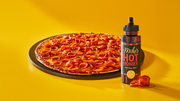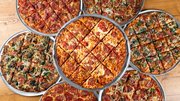Blog
The potential cash in pizzeria plastic trash
Granted, the bans on single-use plastics becoming increasingly common nationwide, do present supply chain and other logistics issues. But in his blog, Ritual co-founder Robert Kim provides good evidence that there are also some bottom line-lifting perks in restricting these items, too.

August 13, 2019 by Robert Kim
Mention words like regulations or bans in the presence of pizzeria operators and you'll get everything from a sigh of exasperation, to an all-out lecture on the business-bending effects of legislation on the pizza business. It's understood. In fact, more than a few pizza brand operators in San Francisco might be making those expressions of frustration this summer after the Golden Gate City last month made it illegal for local restaurants to give customers certain types of so-called single-use plastics, or SUPs, unless a diner asks for them. The city's ban affects four categories of SUPs, including plastic beverage plugs, toothpicks, cocktail sticks and drink stirrers.
The reason, of course, is that too many of these items end up in the waste stream. In fact, currently quick-service brands alone, are reportedly the source of more than $11 billion of SUPs in the globe's already overloaded collection of refuse annually, which dumps millions of tons of plastic annually into landfills, roadsides, waterways and just about everywhere else trash can end up.
For instance, according to a study published in the journal, Science Advances, less than 9% of the plastic consumers use actually gets recycled. And Americans alone discard 500 million plastic straws a day, according to research cited by the National Parks Service.
Nonetheless, although there are a lot of dollars and public good to be gained around reduced use of these types of disposables, there also remains plenty of controversy around SUP bans. Many pizza brand leaders want, and likely need, to know more about the issue and the bans related to it, including:
- How does the San Francisco SUP ban work and will it impact my customers?
- What does that city's SUP ban do anyway and how might it ultimately affect both my business and the environment?
- What other strategies can I implement to help my brand go green?
What SUPs mean to restaurants — fact vs fiction
First, it's important to understand that in San Francisco, the ban bars restaurants from automatically providing SUPs to customers with their orders, but it does not ban SUPs. Customers can still ask for and receive such products with their orders. Likewise, many cities that pass such laws institute grace periods to allows brands to find alternatives for SUPs while also giving brands and the municipality time to let customers know about the changes.
Other cities are allowing restaurants to apply for waivers to such bans if a brand is experiencing financial hardship. There are also provisions and exceptions being made that allow restaurants to provide such products to customers with disabilities and those making special requests.
For the overall environment, SUP bans greatly reduce the amount of unwanted and unnecessary waste produced every day. In fact, our data at Ritual suggests that SUP bans are actually exactly what the customer ordered, so to speak, since our research indicates that brands using our food ordering app platform see only 13-25% of customers request plastic cutlery with their meals anyway.
Given those numbers, it's likely that up to 87% of the budget a restaurant allocates to SUPs is actually being spent on unwanted, wasted materials. Providing customers with SUPs that they never asked for is the equivalent of throwing your money in the trash, or in this case, into the environment.
The 'greener' path
But there are many other ways pizza brands can increase the green in their bottom lines by also practicing greener operations overall. For instance, Ritual's research indicated that brands can donate electronics to environmentally friendly causes in 16 cities nationally, while also receiving tax writeoffs.
As an example, look into the Houston Zoo's recent campaign that helped raise awareness about how improper battery waste can impact gorilla habitats. Your brand might also research like-minded organizations with similar programs to donate electronics or partner with a conservation nonprofit and help fund a drive in your market or markets.
In the meantime, you can also use eco-friendly products like compostable containers and paper straws or offer customers options for reusable containers such as mugs. Even consider providing a small discount to customers who use their own containers since your restaurant will recover the cost of the discount with the money you're saving on SUPs.
In the end, SUP bans benefit the environment, customers and food service alike. By making eco-friendly operational changes and adopting greener alternatives, brands can get ahead of the ban, reduce waste and seize the moment to go green.
Photo: iStock
About Robert Kim
Robert Kim is a Co-Founder of Ritual, the mobile pickup app connecting restaurants with customers to offer a simple time-saving way to, pay for and pick up lunch and coffee orders for themselves and colleagues On the platform, restaurants have seen 3-4x growth in repeat customers & order sizes.
 ChatGPT
ChatGPT Grok
Grok Perplexity
Perplexity Claude
Claude








